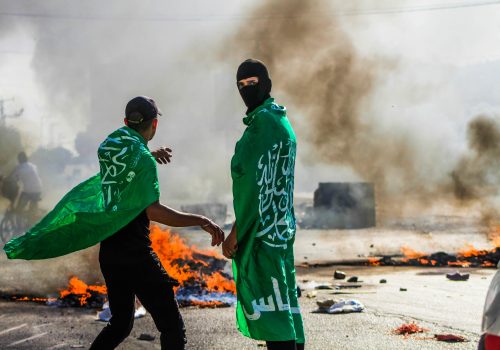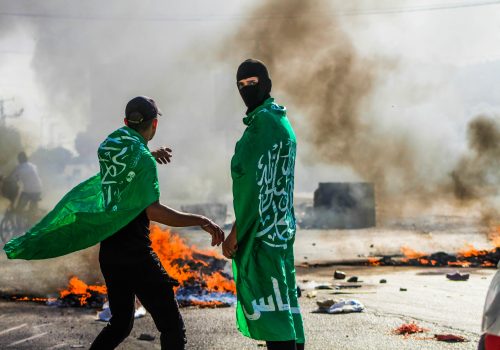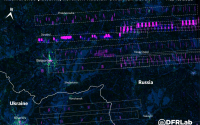
Live expertise: The latest insight as Israel prepares for a ground invasion of Gaza

In the aftermath of Hamas’s brutal October 7 attack on Israel, the Israeli government appears set for a ground invasion of the Gaza Strip with the goal of completely destroying the terrorist organization. Meanwhile, the ongoing Israeli siege of Gaza has set off a dire humanitarian crisis, with more than a million Gazans displaced as the Israeli government ordered residents to evacuate from the enclave’s north.
Atlantic Council experts are keeping close watch on the ongoing Israel-Hamas war and on the reactions around the globe. As the conflict continues into its second week, find the latest updates below. Click here to get caught up on last week’s expert analysis.
The latest updates
MONDAY, OCTOBER 16 | 12:00 PM RALEIGH
Frozen Iranian assets pose a challenging policy question for the Biden administration
The Biden administration’s move to restrict Iran’s access to the six billion dollars transferred from South Korea to Qatar in the wake of Hamas’s vicious assault on Israel was met with approval in Washington and reprobation in Tehran. The move followed substantial bipartisan pressure, but the publicity surrounding the announcement to Democratic legislators sets up a challenging policy question in the future. The Biden team has sought to engage Tehran in negotiations after the Trump administration withdrew from the Iran nuclear deal, and one reason such entreaties have failed is Iran’s mistrust of Washington’s follow-through on deals.
Given that backdrop, the Biden administration may want at some point to let these funds be used for their original purpose—humanitarian goods exchanged for American hostages in Iran—especially if it wants to revive negotiations over Iran’s nuclear program (or, if Iran takes more hostages). To do so, it will have to navigate the complex political issues surrounding the US relationship with Israel (which will likely be upset by any release of funds to Iran), potential bipartisan backlash, and a looming presidential election. All to say that should these funds be opened back up to Iran, it seems likely that the timing of that release will not be until after November 2024.
—Brian O’Toole is a nonresident senior fellow with the Atlantic Council’s GeoEconomics Center. He is a former senior adviser to the director of the Office of Foreign Assets Control at the US Department of the Treasury.
MONDAY, OCTOBER 16 | 11:25 AM WASHINGTON
What was Hamas thinking? And what is it thinking now?
The size, scale, and brutality of Hamas’s October 7 assault on Israel suggests that the group’s aim was to fundamentally change the strategic dynamic with Israel and the Palestinian Authority, and probably in the larger region, as well.
Hamas may have believed Israel was weakened, distracted, and divided by its internal political turmoil over the past year, making this a good time to strike. Perhaps Hamas thought a surprise attack would widen political divisions in Israel, upend the Israeli government, and sap the resilience and determination of the Israeli people to prevail, rather than produce the unity and resolve the world is currently seeing. Hamas may also have calculated that it had an opportunity to deal a knockout blow to the Palestinian Authority. The popularity of President Mahmoud Abbas and the Authority itself had been plummeting, and hardline factions, including Hamas cells, had begun to gain traction in the West Bank by taking the fight to Israel. The October 7 attack appears to have been specifically timed to coincide with the fiftieth anniversary of the 1973 Yom Kippur war—in which Israel’s apparent invulnerability was called into question by successful surprise attacks from Egyptian and Syrian armies—to catch the Jewish state off guard and deal it a major blow.
It also appears that a key aim of the attack was to derail the ongoing Saudi-Israeli talks aimed at normalizing relations between the two countries. Hamas, Hezbollah, and Iranian officials have publicly condemned the Saudi-Israeli discussions, and Hamas and Hezbollah officials reportedly also have cited the talks—which they view as a sellout of resistance to Israel’s presence in Muslim lands and a betrayal of the Palestinians—as a major motivation for Hamas’s October 7 assault on Israel. These groups recognize that the establishment of normal relations between Saudi Arabia and Israel poses a strategic threat to their cause that would strengthen the pro-Western countries in the region and leave the Iran-led “Axis of Resistance” isolated.
Read more from Alan Pino, a former US national intelligence officer for the Near East.
FRIDAY, OCTOBER 13 | 8:53 PM WASHINGTON
Israel’s information blockade on Gaza will challenge how we think about war
In a thread on X (formerly Twitter), Emerson T. Brooking, a resident senior fellow at the Atlantic Council’s Digital Forensic Research Lab and co-author of LikeWar: The Weaponization of Social Media, analyzed the impact and implications of a possible Israeli blockade of the internet in Gaza.
First, the stakes. Without information access, it is harder for civilians to stay alive.
Civilians' ability to transmit information enables international awareness and military accountability.
This is articulated in U.S. policy (ht @samfbiddle). 2/ https://t.co/9rorbqMxzJ pic.twitter.com/pbiVtQKxMP
— Emerson T. Brooking (@etbrooking) October 14, 2023
For recent operational precedent, I have been thinking about the IDF siege (and imminent invasion) of Gaza as compared to the Russo-Ukrainian War. Specifically, Russia's ~2-month reduction of Mariupol. 4/ https://t.co/NYU9w6ae75
— Emerson T. Brooking (@etbrooking) October 14, 2023
But Gaza and Mariupol differ in major ways. Gaza is bigger (~360 square km vs ~170). Yet nearly all of Gaza's 2.3 million inhabitants remain, whereas Mariupol had dropped to ~100k inhabitants by the time of the siege.
Never have so many people stood to lose access at once. 6/ pic.twitter.com/5WvximY6zO
— Emerson T. Brooking (@etbrooking) October 14, 2023
Especially after street fighting begins, it is hard to imagine how international bureas might sustain any sort of infrastructure or presence.
One should also not expect many donated Starlink terminals, either. 8/
— Emerson T. Brooking (@etbrooking) October 14, 2023
But easier said than done. Israel has engaged in at least four information conflicts alongside some sort of kinetic operation: in 2012, 2014, 2017, and 2021's "TikTok War" that accompanied Al-Aqsa mosque demonstrations (see @alexbward's coverage). 10/ https://t.co/BN7bPlBZTD
— Emerson T. Brooking (@etbrooking) October 14, 2023
Finally, what might be the effect of this information blockade, beyond increasing civilian risk?
One thing I do not think it will accomplish is reducing the volume of pro-Palestinian speech, which will surely rise as the IDF launches ground operations. (pic from 2014) 12/ pic.twitter.com/4MOvRUIm67
— Emerson T. Brooking (@etbrooking) October 14, 2023
And if such an "information desert" comes to pass, I expect that it will serve to confuse or obfuscate whatever very real primary source material that still makes its way out of Gaza.
This is already a common frame in any Israel-Palestine conflict. 14/ https://t.co/0fKO78pCyR pic.twitter.com/9tXvrUiXJt
— Emerson T. Brooking (@etbrooking) October 14, 2023
It's my view that, despite the AP's heroic reporting, the Russian information blockade successfully fragmented public awareness of what happened in Mariupol.
I believe a similar thing will happen here. 16/16 pic.twitter.com/5n8YAwALod
— Emerson T. Brooking (@etbrooking) October 14, 2023
Image: Israeli soldiers stand in a tank near Israel’s border with the Gaza Strip, in southern Israel October 15, 2023. REUTERS/Ronen Zvulun

